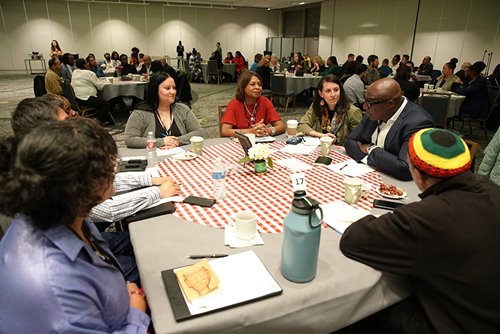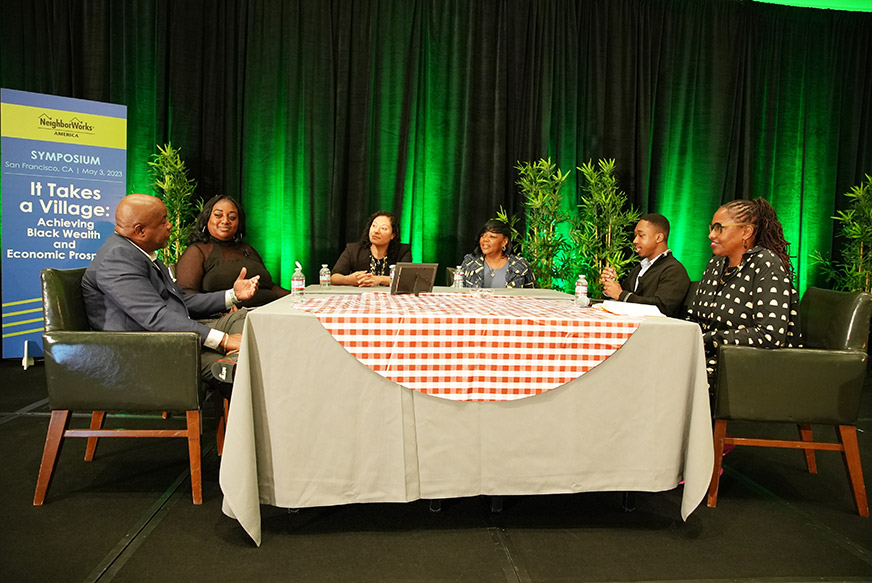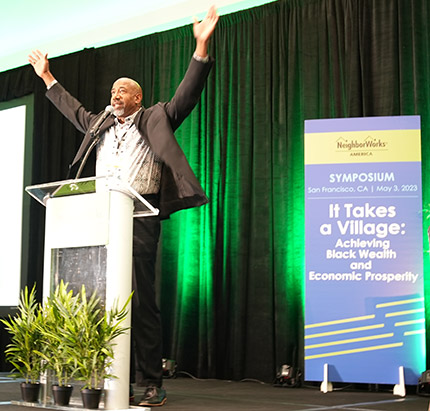More than 300 people gathered at the NeighborWorks Training Institute this month for "It Takes a Village: Achieving Black Wealth and Economic Prosperity," part of a symposia series with a focus on advancing equity for people of color.
 "The statistics on Black wealth are staggering," NeighborWorks America's President & CEO Marietta Rodriguez shared in her introduction. "When the Emancipation Proclamation was signed more than 150 years ago, the Black community owned a combined half percent of the total wealth in the United States. Today, that number has increased to only 1%. That is not okay."
"The statistics on Black wealth are staggering," NeighborWorks America's President & CEO Marietta Rodriguez shared in her introduction. "When the Emancipation Proclamation was signed more than 150 years ago, the Black community owned a combined half percent of the total wealth in the United States. Today, that number has increased to only 1%. That is not okay."
The opening panel for the symposium, with speakers seated around a table, was meant to evoke the kitchen table. Anne Price of The Maven Collective said a kitchen table was a place for discussion and represents the honest, personal and deep debates about the things that affect the Black community. It was the perfect place to strategize about prosperity.
NeighborWorks also introduced its Black Wealth and Asset Building Group, which is creating strategies centered around Black prosperity. The cross-divisional group includes NeighborWorks network organizations that have implemented programming in this area.
Ramona Johnson, one of the founders of the group and the senior relationship manager in NeighborWorks' Southern Region, said the goal was "to see how we could bring forward much of our lived experience, our work experience, the experience in our families and our communities to come together to see how we can move the needle."

"I've seen the trauma and insecurity that comes from not having a space to call home that's permanent," shared Shannon McQueen, director of strategic partnerships at Manna Inc. "Wealth, to me, means grounding. It means owning the land, sustaining it, maintaining it and passing it on."
Kathy Flanagan Payton, president and CEO at Fifth Ward shared similar sentiments. "We have to open our door, bring our seat to the table and demand to be treated equitably. People are depending on us."
 Experts agreed that working together and with partners was the best way to move forward. "When we as a village rise up, we can do this thing," said Pastor Joe Daniels Jr., of the community development organization Emory Beacon of Light. "We wouldn't be here without the village." Government or civilian, rural or suburban, he said "the way to change is to help people understand how those sectors work together."
Experts agreed that working together and with partners was the best way to move forward. "When we as a village rise up, we can do this thing," said Pastor Joe Daniels Jr., of the community development organization Emory Beacon of Light. "We wouldn't be here without the village." Government or civilian, rural or suburban, he said "the way to change is to help people understand how those sectors work together."Along with advice, the day was filled with a call to "do the work" and words of inspiration:
- Building resources and building trust are key, said Lori Gay, CEO at Neighborhood Housing Services of LA County and Black Community Developers Group. "People come to us because they trust us and our organizations.
- Mentoring others is essential, according to Sharon Kent, leader of Our Money Matters, and so is providing opportunities for career exploration and financial education.
- Stories themselves are a type of wealth that can be passed down, and their importance should not be underestimated, said Jewel Burks Solomon, keynote speaker and head of Collab Capital. "Wealth is the accumulation of the resources, the land and the money. But it's also the stories. Wealth is also preservation of the stories and the culture and who we are as a people."
- Black families lost so many chances for wealth due to barriers like redlining, Jim Crow and enslavement, Burks Solomon said. "I believe if you understand the constant harm that has been done over centuries, there has to be restitution for that harm. I also believe that in the meantime, there are little reparations that can happen in lots of different ways in lots of different places and lots of different spaces."
- Community wealth often transitions to individual wealth, said Ivan Holloway, board president at Network for Developing Conscious Communities. "We need to help individuals understand they can work together to build business cooperatives."
- "It's not up to one person, one group or one business. To help with the racial wealth gap and the disparities that exist, it's up to all of us," said Deidra Porché, managing director of National Head of Community and Business Development, Consumer Banking at JPMorgan Chase.
- "Talk is cheap if we don't take action," said Watchen Harris Bruce, president and CEO at Baltimore Community Lending & African American Alliance of CDFI CEOs.

